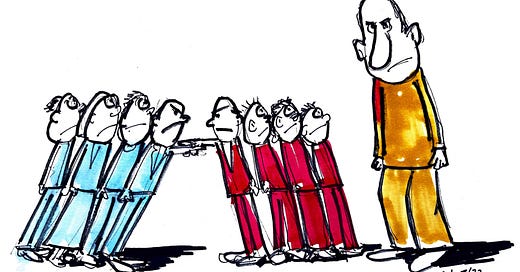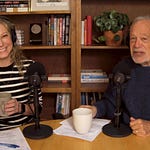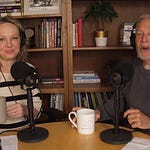Okay, I’m going to go out on a limb today and suggest something that would have seemed utter nonsense as late as a month ago: I’m seeing the stirrings in Washington of a new era of … I’m not sure what to call it. “Unity” is way too strong. “Bipartisanship” is premature. “De-partisanship” is too clunky.
But something new seems to be happening, and Vladimir Putin is responsible.
Don’t get me wrong. Democrats and Republicans won’t join hands and sing Kumbaya anytime soon. Mitch McConnell and Kevin McCarthy will continue to ambush Democrats every chance they get. Expect bitter battles over background checks, immigration reform, civil rights protections, and Ketanji Brown Jackson’s confirmation to the Supreme Court. Trump won’t stop telling his big lie. Your Fox News-obsessed Uncle Bob will remain in his hermetically sealed alternative universe.
Yet ever since the run-up to Putin’s invasion of Ukraine, I’ve noticed something in Washington that I haven’t seen since in three decades –- a quiet understanding that we’re on the cusp of a new Cold War, potentially even a hot one. Which requires that we join together in order to survive.
It’s a subtle shift – more of tone than anything else. I saw it yesterday when Volodymyr Zelensky addressed Congress from Ukraine. When he showed lawmakers a gut-wrenching video of the war’s consequences, many eyes filled with tears. The lawmakers shared, according to Maine’s independent Senator Angus King, “a collective holding of breath.” That Republicans and Democrats shared anything — that they were even capable of a collective emotion — is itself remarkable.
With bipartisan support, Ukraine is receiving unprecedented military and humanitarian aid to fight Putin’s war, including anti-aircraft systems that many experts say can defend against bombs and missiles from Russia’s land-based weaponry.
Beyond Ukraine, you can also discern the shift in a series of recent across-the-aisle agreements. After literally two hundred failed attempts, the Senate just passed an anti-lynching law. The Senate has also given sexual misconduct claims firmer legal footing with a new law ending forced arbitration in sexual assault and harassment cases. The Senate also just approved sweeping postal reform. And unanimously decided to keep Daylight Savings Time year-round. And it has given the green light to long-awaited reauthorization of the Violence Against Women Act as part of a massive spending bill.
I’m hearing from Senate staffers that they’re close to bipartisan agreement to strengthen antitrust laws. Also on a measure to expand semiconductor manufacturing in America, as part of a new China competitiveness bill. And another measure to limit the cost of insulin.
Okay, none of this is as dramatic as protecting voting rights or controlling prescription drug costs. But compared to the last few years, it’s extraordinary. (You may not have heard much about these initiatives because the media only picks up on bitter conflict and name-calling.)
Something new is happening in Washington, and I think I know why.
You see, I came to Washington in 1974, in the Ford administration, and then worked in the Carter administration. The Cold War was raging during those years, serving as a kind of silent backdrop for everything else. Democrats and Republicans had different views on a host of issues, but we worked together because it was assumed that we had to. We faced a common threat.
The Cold War had produced an array of bipartisan legislation involving huge investments in America — legislation that was justified by the Soviet threat but in reality had much more to do with the needs of the nation. The National Interstate and Defense Highway Act was designed to “permit quick evacuation of target areas” in case of nuclear attack and get munitions rapidly from city to city. Of course, in subsequent years it proved indispensable to America’s economic growth.
America’s huge investment in higher education in the late 1950s was spurred by the Soviets’ Sputnik satellite. The official purpose of the National Defense Education Act, as it was named, was to “insure trained manpower of sufficient quality and quantity to meet the national defense needs of the United States.” But it trained an entire generation of math and science teachers, and expanded access to higher education.
The Defense Department’s Advanced Research Projects Administration served as America’s de facto incubator for new technologies. It was critical to the creation of the Internet as well as new materials technologies. John F. Kennedy launched the race to the moon in 1962 so that space wouldn’t be “governed by a hostile flag of conquest” (i.e., the Soviet Union). But it did much more than this for America.
Then, in November 1989, the Berlin Wall came down. And in December 1991 the Soviet Union collapsed.
Just three years later, Newt Gingrich became Speaker of the House -- and instigated the angriest and most divisive chapter in modern American political history. I was there. I remember the change in Washington, as if a storm had swept in. Weeks before, Republican members of Congress occasionally gave me a hard time, but they were generally civil. Suddenly, I was treated as if I were the enemy.
Looking back, I can’t help wonder if the Cold War had held America together — gave us common purpose, reminded us of our interdependence. With its end, perhaps we had nowhere to turn except on each other. If the Cold War had not ended, I doubt Gingrich would have been able to launch a new internal war inside America. Had the Soviet menace remained, I doubt Donald Trump would have been able to take up Gingrich’s mantle of hate and conspiracy.
Putin has brought a fractured NATO together. Maybe he’s bringing America back together too. It’s the thinnest of silver linings to the human disaster he’s creating, but perhaps he’ll have the same effect on the U.S. as the old Soviet Union did on America’s sense of who we are. What do you think?














Share this post